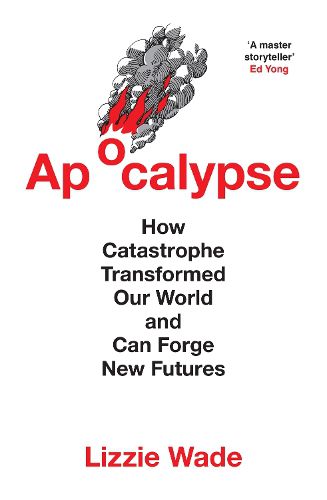Readings Newsletter
Become a Readings Member to make your shopping experience even easier.
Sign in or sign up for free!
You’re not far away from qualifying for FREE standard shipping within Australia
You’ve qualified for FREE standard shipping within Australia
The cart is loading…






A groundbreaking new perspective on catastrophes throughout human history, with vital lessons for our future
'This book upended my understanding of the ancient world' Zoe Schlanger, author of The Light Eaters
'Lizzie Wade is an exceptional journalist and a master storyteller' Ed Yong, author of An Immense World
The history of humanity is one of devastating, once-in-a-thousand-year events: rising seas that make land uninhabitable, decades-long droughts, civilisational collapse, epidemics like the Black Death and the Spanish Flu that reduce a city's population by fifty percent. And yet, despite enormous destruction and very real tragedy, these catastrophes all share one common denominator: we survived.
In APOCALYPSE, Lizzie Wade reframes the story of human history to show how we can learn from these apocalyptic moments, seeing them not just as violent, world-ending events but as moments of progress and transformation. We travel back in deep time to when homo sapiens replaced other human species including the Neanderthals, witness the fall of the kingdom of Old Egypt, the end of the Mayans and the Black Death, as well as lesser-known catastrophes. To weave this unique narrative, Lizzie introduces us to a new generation of archaeologists using cutting-edge technology to tell new stories about our deep past, including flying planes equipped with lasers over Mayan ruins deep in the jungle, scuba diving to the bottom of the ocean, and sequencing the DNA of ancient people to show how we are far more connected to our ancestors than we think.
Written in a gripping style that reads like an Indiana Jones mystery, APOCALYPSE offers a refreshingly optimistic take on the crises our own generation and those after us will face - arguing that yes, catastrophes are painful and destructive, but we can and will survive them.
$9.00 standard shipping within Australia
FREE standard shipping within Australia for orders over $100.00
Express & International shipping calculated at checkout
A groundbreaking new perspective on catastrophes throughout human history, with vital lessons for our future
'This book upended my understanding of the ancient world' Zoe Schlanger, author of The Light Eaters
'Lizzie Wade is an exceptional journalist and a master storyteller' Ed Yong, author of An Immense World
The history of humanity is one of devastating, once-in-a-thousand-year events: rising seas that make land uninhabitable, decades-long droughts, civilisational collapse, epidemics like the Black Death and the Spanish Flu that reduce a city's population by fifty percent. And yet, despite enormous destruction and very real tragedy, these catastrophes all share one common denominator: we survived.
In APOCALYPSE, Lizzie Wade reframes the story of human history to show how we can learn from these apocalyptic moments, seeing them not just as violent, world-ending events but as moments of progress and transformation. We travel back in deep time to when homo sapiens replaced other human species including the Neanderthals, witness the fall of the kingdom of Old Egypt, the end of the Mayans and the Black Death, as well as lesser-known catastrophes. To weave this unique narrative, Lizzie introduces us to a new generation of archaeologists using cutting-edge technology to tell new stories about our deep past, including flying planes equipped with lasers over Mayan ruins deep in the jungle, scuba diving to the bottom of the ocean, and sequencing the DNA of ancient people to show how we are far more connected to our ancestors than we think.
Written in a gripping style that reads like an Indiana Jones mystery, APOCALYPSE offers a refreshingly optimistic take on the crises our own generation and those after us will face - arguing that yes, catastrophes are painful and destructive, but we can and will survive them.
Learn more about our world with history books exploring civilations across time.
Discover new nonfiction books at Readings, with biography, memoir, essays and analysis.